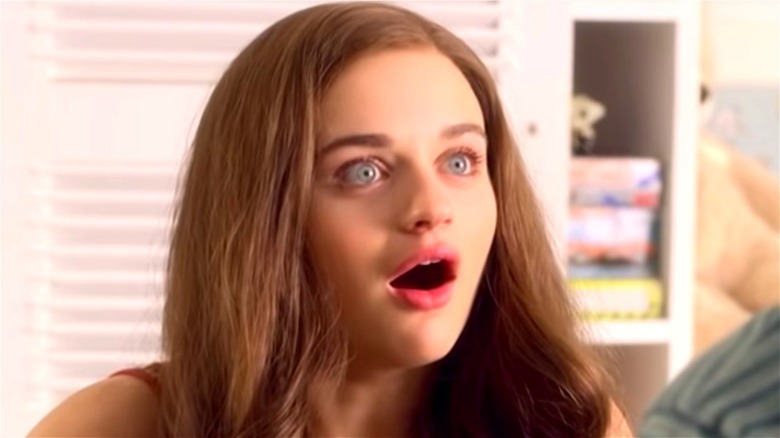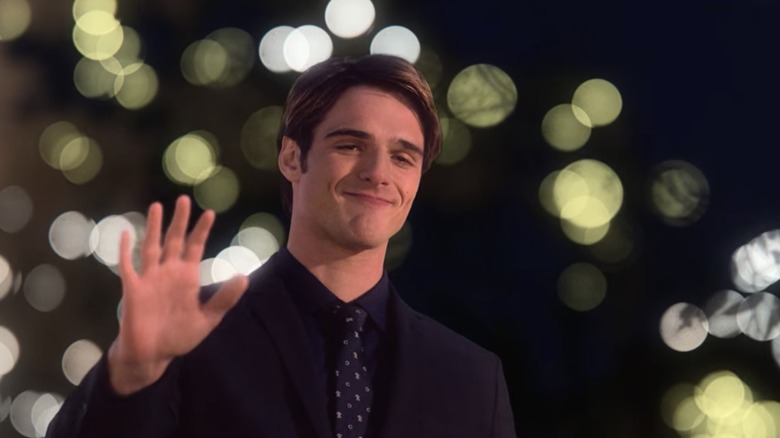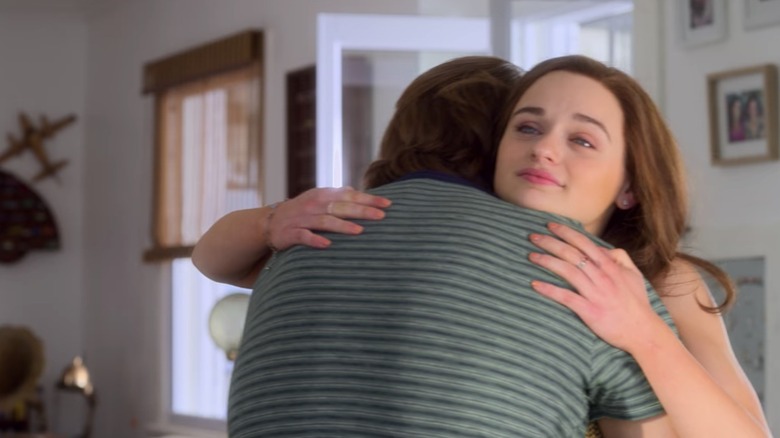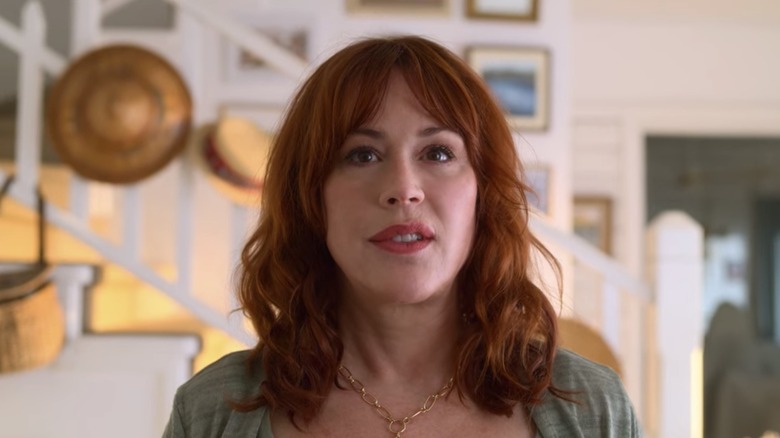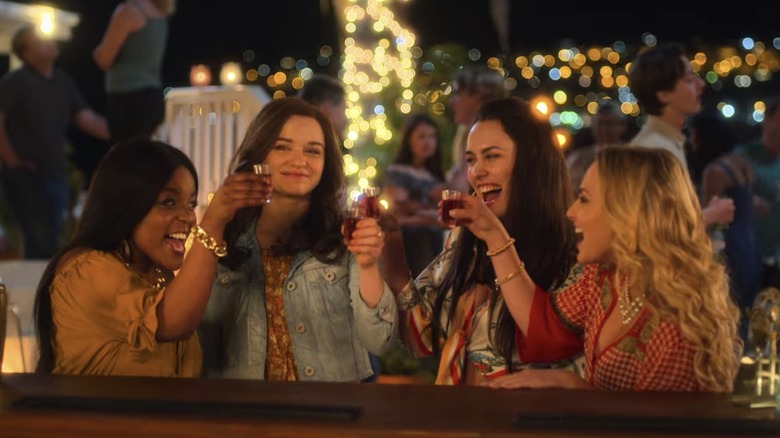The Ending Of The Kissing Booth 3 Explained
Contains spoilers for The Kissing Booth 3
The third and final installment of the "The Kissing Booth" movie series, which was announced a year ago just after "The Kissing Booth 2" released (via Hollywood Reporter), offers the same appealing cast, adorable friendship montages, amusing video game references, and deplorable communication between characters as the first two films. This makes it the pitch-perfect conclusion to the story of Elle Evans (Joey King), whose close friendship with Lee Flynn (Joel Courtney) and romance with Noah Flynn (Jacob Elordi) sees some major challenges during the summer after high school graduation. That's despite this version not taking place at a school and that the actual kissing booth that's been such a plot point in the previous movies not making an appearance until almost the last scene.
The three movies have always focused on the friendship — and the friendship rules — that Lee and Elle made when they were six years old. As the two grow into adults, the rules become harder to maneuver, especially for Elle, even as they bond the two closer together. The competition and jealousy, the prospect of long-distance relationships, changes in family situations, and the problems these teenagers have in talking to one another all come together in this last film. Is it a satisfying, fitting ending that lives up to expectations? Well, mostly, if you were a previous fan. Is there a lot to discuss? Definitely.
Elle and Noah get a cheesy and romantic ending, but it's not what you might expect
The relationship between Elle and Noah has been called "toxic" because it's been marked by jealousy and lies and omissions of truth on both sides, which has resulted in dramatic outbursts like the one that ruined Thanksgiving in "The Kissing Booth 2." Noah has always been a bit of a rebel and a hothead, although his feelings for Elle appear real. These two don't tend to bring out the best in each other, but that doesn't mean they haven't had their sweet moments, too (although we're still trying to figure out how Elle never found out that was Noah in the Batman mask in the first movie). There's something so captivating, especially for the intended audience of this film, about a lifelong hopeless and forbidden crush becoming unexpectedly reciprocated.
Whether or not you're rooting for this couple, they've shown a certain level of persistence in staying together and they've been through a lot at this point, which makes their final (?) separation powerful and poignant. "The Kissing Booth 3" leaves their potential happy ending ambiguous, but also gives their reunion, six years later, an extra layer of meaning in the way that they part. You may recall in "The Kissing Booth 2" that, as Noah goes off to college, Elle says, "And don't turn back for a final wave. That is way too cheesy and romantic." In this movie, after they've met again at the kissing booth and he's leaving up some lighted stairs through an arch, he does just that.
So, do they end up together? Given this is probably the last installment, fans can probably use their imaginations to figure that one out. Maybe the novelization of the story, "The Kissing Booth 3: One Last Time," due out on August 17, will clarify. Or maybe not.
Elle becomes empowered to figure herself out
"The Kissing Booth" series ends with the female protagonist alone, finally trying to figure herself out. It's a refreshing development, putting the show firmly in the camp of coming-of-age territory rather than typical romantic comedy. Recall that Elle, after her late-blooming development that turned her into A-list material in the first movie, has spent the entirety of the series trying to juggle the conflicting demands of her boyfriend, her best friend, her best friend's girlfriend, her new pal-who-wants-more-than-friendship Marco (Taylor Zakhar Perez), and her own family. Everything eventually blows up in her face and she temporarily loses them all Movie No. 3. She gets a stern talking-to from her father Mike (Stephen Jennings), who's been nothing but supportive of her throughout her struggles, even when she decided she wanted to go to a college he could ill afford.
However, she nails it when she tells Lee, "I care about you both so much that I've spent my life doing what's best for our relationships, but I haven't really gotten to spend much time thinking about what would make me happy." She tells him she has to figure out who she is on her own. Cue the cheers, because this journey through life, and her all-important college decision, has never before been about what she wanted. All the clues as to what her future goals should have been were always apparent to viewers — the love of video games and "Dance Dance Mania" (the "Dance Dance Revolution" stand-in), the love of the beach, and the importance of being there for her brother and father following the loss of her mother. Shedding her best friend and her boyfriend allow her to finally bloom, in a less physical and more emotional and intellectual way.
Molly Ringwald graduates from teen drama queen to wise mother figure
"The Kissing Booth" movies have always had some fun throwbacks for older viewers, harking back to teen movies and pop culture from earlier eras — like the use of Toni Basil's "Mickey" in the first movie and ELO's "All Over the World," made famous by Olivia Newton-John's 1980 movie "Xanadu," which is used with the third movie's blooper reel. Even the "Dance Dance Revolution" bits are reminiscent of Megan Fox and Lindsay Lohan's dance battle in "Confessions of a Teenage Drama Queen" from 2004.
One of the most prominent '80s references comes through Molly Ringwald, who was the "it girl" in the iconic John Hughes movies from the '80s. "The Kissing Booth" has turned her from a similar teen in dramatic situations to the wise mother figure who shepherds Elle into recognizing the way she tries to please everyone but herself. It's not quite the same as the "My childhood princesses have turned into generals" meme that went viral in 2018 after "Wonder Woman" came out, but it's somewhat more realistic.
Ringwald's character, Sara Flynn, has her own subplot in "The Kissing Booth 3." Her actions in denying a corporation her beach house so they can knock it down and redevelop the region may be a touch cliché, but it's also a nice little piece of characterization that grounds the action in the movie. Sara is the rock of her family and of Elle's world, too. It's only fitting that she becomes the one who preserves the site of so many memories that have helped to mold who the main characters have become.
Relationships and friendships change, but they shape you
One of the themes that permeates "The Kissing Booth" series is that of relationships and friendships that change you, even though they may not last. An outside, outsized catalyst, such as a kissing booth, can change everything. After Elle says goodbye to Marco, she says in a voiceover narration, "People pass through our lives. Some of them fade into memories, but a few become part of who you are." Many of the characters in the movies have had their lives changed by the fundraiser that Elle and Lee dreamed up in the first movie, like new couples Ollie (Judd Krok) and Miles (Evan Hengst) or Lee and Rachel (Meganne Young). And those relationships, whether or not they last, affect the people in them forever. That appears to be one of the film's takeaway messages, at least.
As the final installment of a series that's taken three years to run its course, the movie ended some relationships (at least temporarily) and continued others, both for some of the franchise's more forgettable characters and its prominent ones. Elle's relationship with the woman her father is dating, Linda (Bainca Amato), is a new one that adds conflict to Elle's home life and doesn't see a conclusion. Noah's friendship with Chloe (Joni Evans) looks like it's turning into what Noah wanted — something that resembles Lee and Elle's bond. The interactions between the high school students and their peers at an end-of-high-school beach party feels both like a conclusion and a beginning, which is probably exactly what its creators intended. It's all a bit messy, a little ambiguous, and a touch exaggerated — much like life.
